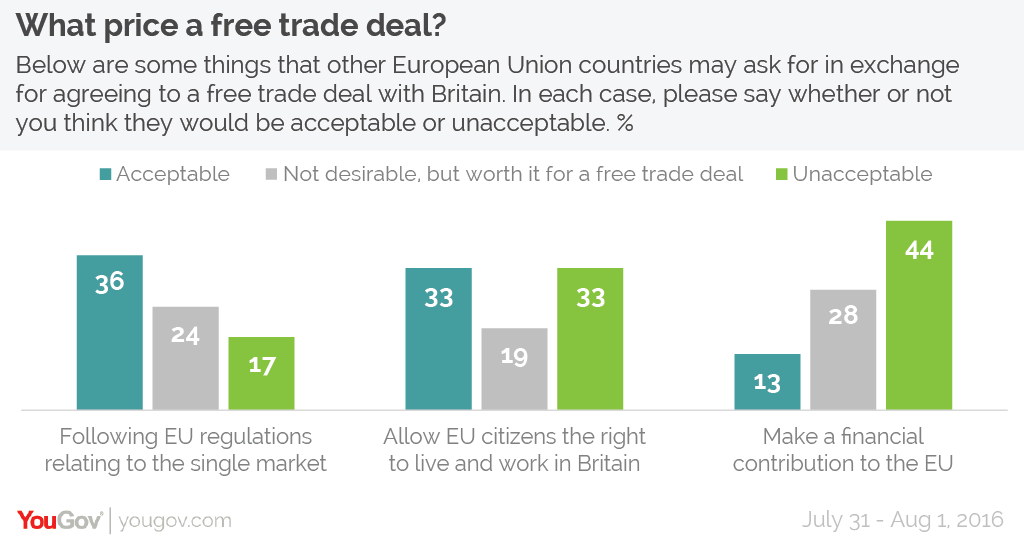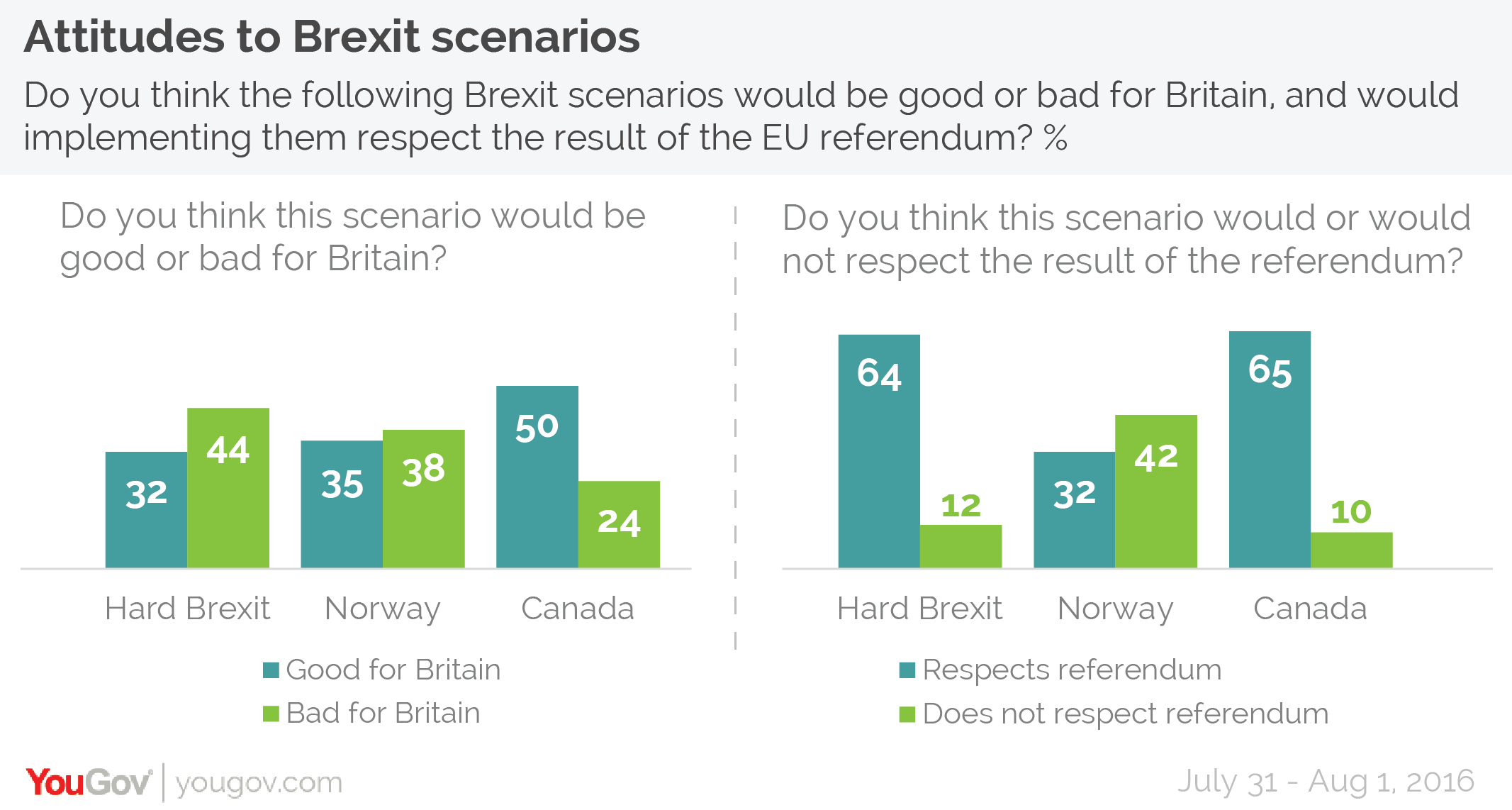
Posted on 09/05/2019 1:54:18 AM PDT by Cronos
In June Britain voted to leave the European Union, and when Theresa May took over as Prime Minister she was clear that Brexit meant Brexit. The question is, exactly what sort of Brexit? Amidst all the discussion of different types of deal, of whether Britain should swap freedom of movement for free trade, exactly what do the public want the government to do? What would be seen as good for Britain, and what would be seen as betraying the result of the referendum?
To start with, a large majority of people think that the government should follow the result of the referendum and leave: by 69% to 22% the public think that Brexit does need to mean Brexit. The overwhelming majority of people who voted for Britain to leave the European Union obviously think that the government should go ahead and leave. The 48% who voted to stay are more evenly split – 49% of Remain voters think the government should bow to public opinion and leave the European Union, 45% think that the government should ignore the result or seek to overturn it in the second referendum. Among the wider public there is limited appetite for a second vote – by 56% to 34% people think it would unacceptable for the next government to hold a second referendum.
Asked about the type of Brexit they’d like to see, people who voted for Britain to remain in the European Union are largely in favour of as close as possible a relationship in the future. People who voted to leave are generally in favour of a new relationship with the European Union that centres only on free trade.
There is little support for a so-called “hard Brexit” - even among Leave voters. Only 10% of people think Britain should leave the EU completely and not seek any sort of formal trading relationship and only 22% think we should drop out of the EU as rapidly as possible. The vast majority want a more gradual and negotiated exit. 31% think Britain should leave over the suggested two year timescale, 33% think that it would be fine to take even longer than this over our exit.

A large majority of Britons, both Remain and Leave voters, think it is important that Britain secures free trade with the remainder of the European Union once we leave. Opinions divide when it comes to what people think the British government should be willing to agree to in exchange for free trade.
Of course, how the public would actually react to these would end up depending on degree and how they are presented (what sort of financial contribution? What limits, if any, would there be on immigration?), but they provide an idea of how the public are likely to respond to any negotiations.

Another way of looking at it would be the broad type of deal. We also presented respondents with three types of deal that Britain might secure with the rest of the EU (respondents were presented with the deals in a random order).
It is important to note that we are at a very early stage in both the Brexit process and public awareness of the Brexit process and things may easily change once this becomes a more active political debate and the type of deal on offer begins to become clear. There are advantages and disadvantages to the possible outcomes that voters won’t yet be familiar with, and we don’t yet really know what sort of deals will be on the table. Equally, given the complexities of Brexit many people’s opinions will be strongly influenced by how the potential deals come across in the media and in the wider public debate.
However as a starting point it looks as if an EFTA type deal would not be seen as a good deal by the public and, perhaps more importantly, would not be seen as respecting the result of the referendum, particularly by those who voted to Leave. A deal based only on trade, even if that trade is limited, looks as if it would be an easier sell to the public – whether or not is would be the best deal for the country is a different question.
Iirc the canada model agreement was never on the table due to eu intransigence.
In fact they pointed out that the CETA deal was the only one possible due to the UK's red lines.
ok but i do not follow details. I am hing up on the meaning of future and also i am not sure the british voters took into account the cost of a divorce penalty. the may agreement sounded openended, not a thrownswitch to a canada deal...
There isn’t a divorce penalty. It’s just the ongoing cost per the 7 year budget ending 2021.
Right now it’s actually gone down from 39 to 33 b due to the 6 month delay.
>>There isn’t a divorce penalty. It’s just the ongoing cost per the 7 year budget ending 2021.
Why should the UK pay into the EU budget after it’s no longer in the EU? That makes no sense other than being punitive.
The two costs that make up the amount asked for are:
1. the cost of ongoing salaries and pensions for British MEPs like Nigel Farage etc. (and others over the past few decades) + British commissioners like Julian King.
2. The budget is a 7 year budget (2014 to 2021) - so plans were made for projects, quite a few in the UK for that period. This is like three counties agreeing to a joint budget for 1 year, and that's for a bridge, say. Then in October one county says "I'm out" - the county already promised to pay until the end of the budget period.
Let's be clear - the UK is not asked and not expected to pay any money for any activities post the end of the budget period (by 2021) and not for any new projects proposed after they leave.
Disclaimer: Opinions posted on Free Republic are those of the individual posters and do not necessarily represent the opinion of Free Republic or its management. All materials posted herein are protected by copyright law and the exemption for fair use of copyrighted works.